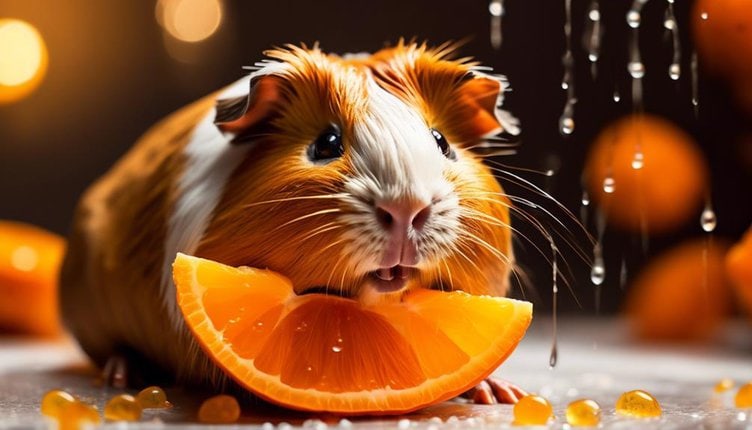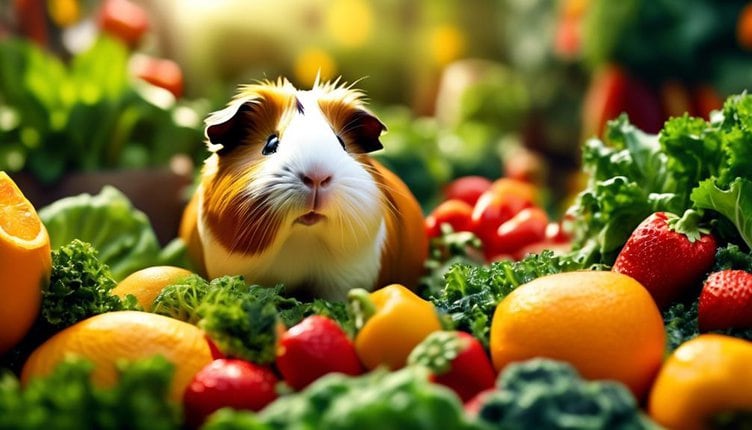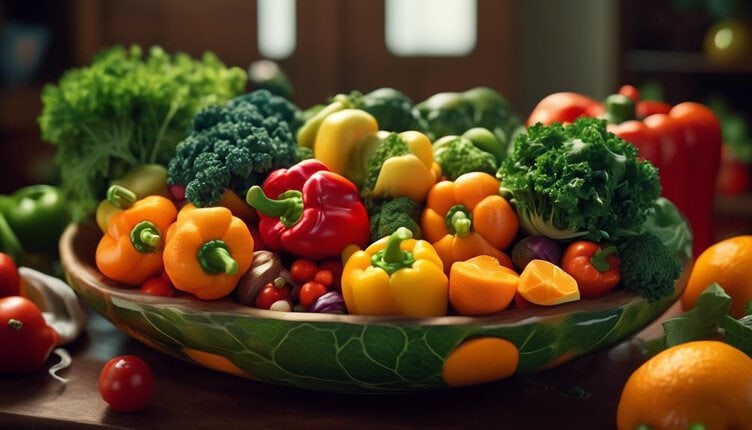Hey there, folks! Did you know that those adorable guinea pigs we all love are actually prone to a little condition called scurvy? Yeah, just like those sailors way back when, guinea pigs can suffer from a lack of vitamin C.
Now, us humans can make our own vitamin C, but these furry little critters need a little help to stay in tip-top shape. So, what are the signs of scurvy in guinea pigs? And how can we make sure they’re getting enough vitamin C in their diet?
Well, buckle up, because we’re about to dive into the importance of vitamin C in preventing scurvy in guinea pigs and discover the best ways to keep these beloved pets happy and healthy.
Let’s get to it!
Key Takeaways
- Guinea pigs cannot produce their own vitamin C and rely on their diet for this essential nutrient.
- Vitamin C deficiency in guinea pigs can lead to scurvy, which manifests in symptoms such as poor wound healing, swollen joints, and hemorrhages.
- Vitamin C plays a crucial role in supporting the immune system, collagen production for wound healing, and overall tissue integrity in guinea pigs.
- It is important to provide guinea pigs with a daily intake of vitamin C through sources such as fresh fruits, vegetables, fortified pellets, and hay, while considering the appropriate dosage to avoid excessive intake and digestive issues.
The History of Scurvy in Guinea Pigs
The history of scurvy in guinea pigs dates back to the early experiments conducted in the 18th century. These experiments were instrumental in understanding the importance of vitamin C in preventing and treating scurvy in both humans and animals. Prior to these experiments, scurvy was a prevalent disease among sailors, but its occurrence in guinea pigs shed light on the underlying cause and potential treatments.
One of the key findings from these early experiments was that guinea pigs, like humans, are unable to synthesize their own vitamin C and thus rely on dietary sources for this essential nutrient. When guinea pigs were deprived of vitamin C in their diet, they developed symptoms of scurvy, such as poor wound healing, swollen joints, and hemorrhages.
The discovery of scurvy outbreaks in other animals further reinforced the importance of vitamin C. For instance, similar symptoms were observed in other species, including primates and certain bird species, when they were deprived of this vital nutrient. This evidence emphasized the universal nature of scurvy and the necessity of vitamin C supplementation in various animal diets.
Symptoms of Scurvy in Guinea Pigs
Symptoms of scurvy in guinea pigs manifest as a result of their inability to synthesize vitamin C and can include poor wound healing, swollen joints, and hemorrhages. Guinea pigs, unlike humans and most other animals, lack the enzyme L-gulonolactone oxidase, which is necessary for the synthesis of vitamin C. As a result, they rely solely on dietary intake of this essential nutrient.
One of the primary symptoms of scurvy in guinea pigs is poor wound healing. As vitamin C is crucial for the production of collagen, a protein that plays a vital role in wound healing, a deficiency can result in delayed or impaired healing. Guinea pigs with scurvy may also exhibit swollen joints due to the breakdown of collagen in their connective tissues. This can lead to pain, stiffness, and reduced mobility.
Additionally, hemorrhages can occur as a consequence of scurvy in guinea pigs. Vitamin C is essential for maintaining the integrity of blood vessels. Without an adequate supply, blood vessels become fragile and prone to rupture, resulting in bleeding.
If left untreated, scurvy can have long-term effects on guinea pigs. Chronic vitamin C deficiency can lead to irreversible damage to the guinea pig’s organs and tissues. It can weaken their immune system, making them more susceptible to infections. In severe cases, it can even be fatal.
To prevent and treat scurvy in guinea pigs, it’s crucial to provide them with a diet rich in vitamin C. This can be achieved through the inclusion of fresh fruits and vegetables, such as bell peppers, kale, and oranges. In cases of severe deficiency, vitamin C supplements may be prescribed by a veterinarian.
The Role of Vitamin C in Guinea Pig Health

Vitamin C plays a crucial role in maintaining the overall health and well-being of guinea pigs. As herbivores, guinea pigs rely heavily on their diet to meet their nutritional needs. Vitamin C, also known as ascorbic acid, is essential for several important functions in their bodies.
One of the key benefits of vitamin C for guinea pigs is its role in supporting their immune system. Vitamin C acts as an antioxidant, protecting the guinea pig’s cells from damage caused by free radicals. It also helps in the production of collagen, a protein that’s important for wound healing and maintaining the integrity of connective tissues.
A deficiency of vitamin C in guinea pigs can have detrimental effects on their health. Guinea pigs, unlike humans, can’t produce their own vitamin C and therefore rely on dietary sources. Without sufficient vitamin C, guinea pigs can develop scurvy, a condition characterized by weakness, swollen joints, poor wound healing, and even death if left untreated.
To prevent vitamin C deficiency in guinea pigs, it’s important to provide them with a diet that’s high in vitamin C. Fresh fruits and vegetables such as oranges, bell peppers, and kale are excellent sources of vitamin C for guinea pigs. Additionally, guinea pig pellets fortified with vitamin C can also be included in their diet.
Recommended Daily Intake of Vitamin C for Guinea Pigs
Guinea pigs require a daily intake of vitamin C to meet their nutritional needs and prevent the onset of deficiency-related health issues. Without sufficient vitamin C, guinea pigs are at risk of developing scurvy, a condition characterized by symptoms such as weakness, weight loss, poor appetite, diarrhea, rough coat, swollen joints, and bleeding gums.
To ensure the optimal health of guinea pigs, the recommended daily intake of vitamin C is as follows:
- 25-30 mg: For healthy adult guinea pigs weighing around 1 kilogram.
- 30-50 mg: For pregnant and lactating guinea pigs, as they’ve higher vitamin C requirements.
- 50-100 mg: For growing and developing guinea pigs, as they need more vitamin C to support their rapid growth.
- 100-200 mg: For guinea pigs with a known history of vitamin C deficiency or those experiencing stress, illness, or injury, as their bodies require additional vitamin C for healing and recovery.
It is important to note that guinea pigs can’t produce their own vitamin C and therefore rely on dietary sources to meet their needs. Fresh fruits and vegetables high in vitamin C, such as bell peppers, kale, broccoli, and strawberries, should be provided daily.
Additionally, vitamin C supplements specifically formulated for guinea pigs can be used to ensure adequate intake. By implementing these recommendations, guinea pig owners can effectively prevent scurvy and promote the overall well-being of their furry companions.
Natural Sources of Vitamin C for Guinea Pigs

To ensure that guinea pigs receive an adequate intake of vitamin C, it’s crucial to understand the natural sources of this essential nutrient. Guinea pigs, unlike humans, can’t produce their own vitamin C and therefore rely on external sources to meet their dietary requirements. Incorporating natural remedies into their diet is an effective way to prevent scurvy and maintain their overall health.
Fresh fruits and vegetables are excellent sources of vitamin C for guinea pigs. Some of the best options include bell peppers, broccoli, kale, and strawberries. These foods not only provide the necessary vitamin C but also offer additional nutritional benefits. It’s important to note that guinea pigs should consume these foods in moderation as excessive amounts can lead to digestive issues.
Another natural source of vitamin C for guinea pigs is hay. Timothy hay, in particular, is known to contain a good amount of this essential nutrient. Including a generous portion of hay in their diet ensures a steady supply of vitamin C.
Best Practices for Supplementing Vitamin C in Guinea Pigs
When it comes to supplementing vitamin C in guinea pigs, it’s crucial to consider the appropriate dosage. According to research, the recommended daily intake of vitamin C for guinea pigs is between 10-30 mg/kg of body weight.
Additionally, it’s important to provide guinea pigs with a reliable source of vitamin C, such as fresh fruits and vegetables.
Dosage for Guinea Pigs
Supplementing guinea pigs with an appropriate dosage of vitamin C is crucial for maintaining their health and preventing scurvy. To ensure the well-being of these adorable creatures, here are some best practices for administering vitamin C:
- Recommended daily intake: Provide 10-30 mg/kg of vitamin C daily to meet the guinea pig’s needs. This amount can vary depending on the guinea pig’s age, weight, and overall health.
- Fresh fruits and vegetables: Incorporate vitamin C-rich foods into their diet, such as bell peppers, kale, and parsley. These natural sources can help supplement their daily intake.
- Water-soluble supplements: Consider using water-soluble vitamin C supplements specifically formulated for guinea pigs. These can be added to their water or food, ensuring they receive the necessary amount.
- Regular veterinarian check-ups: It’s essential to consult with a veterinarian experienced in guinea pig health to determine the appropriate dosage and monitor the guinea pig’s overall health regularly.
Sources of Vitamin C
Guinea pigs can obtain essential vitamin C from a variety of natural sources, ensuring their optimal health and preventing the onset of scurvy. Vitamin C is a crucial nutrient for guinea pigs as they are unable to synthesize it on their own. Incorporating a balanced diet that includes vitamin C-rich foods is essential for meeting their dietary requirements. Some common sources of vitamin C for guinea pigs include fresh fruits and vegetables such as oranges, strawberries, bell peppers, and kale. These foods not only provide the necessary vitamin C but also offer additional health benefits such as antioxidants and fiber. It is important to note that guinea pigs are unable to store vitamin C in their bodies, so a consistent supply of this nutrient is necessary to prevent vitamin C deficiency and associated health problems.
| Food | Vitamin C Content (mg per 100g) | Serving Size (grams) |
|---|---|---|
| Oranges | 53 | 100 |
| Strawberries | 59 | 100 |
| Bell Peppers | 80 | 100 |
| Kale | 120 | 100 |
| Broccoli | 89 | 100 |
Providing a varied diet that includes these vitamin C-rich foods can help ensure the well-being of guinea pigs and prevent the development of scurvy.
Preventing Scurvy in Guinea Pigs: Tips and Tricks

Preventing scurvy in guinea pigs is essential for their overall health and well-being. One key aspect of prevention is ensuring an adequate intake of vitamin C. Guinea pigs are unable to synthesize vitamin C on their own, so it’s crucial to provide them with sufficient sources of this essential nutrient.
The daily recommended dosage of vitamin C for guinea pigs is typically around 10-30 mg per day, depending on the age and weight of the animal.
Vitamin C Sources
Including a variety of fresh fruits and vegetables in a guinea pig’s diet is crucial for providing the necessary vitamin C to prevent scurvy. Guinea pigs, like humans, can’t synthesize their own vitamin C, making it essential to obtain it from external sources. Here are four excellent sources of vitamin C that can be included in a guinea pig’s diet:
- Bell peppers: Red, yellow, and green bell peppers are rich in vitamin C and can be fed to guinea pigs in small quantities as a tasty treat.
- Kale: This leafy green vegetable isn’t only packed with vitamin C but also provides other essential nutrients like calcium and fiber.
- Oranges: The juicy flesh of oranges isn’t only a great source of vitamin C but also adds variety to a guinea pig’s diet.
- Strawberries: These sweet, juicy berries aren’t only a delicious treat for guinea pigs but also provide a good amount of vitamin C.
Daily Recommended Dosage
To ensure the prevention of scurvy in guinea pigs, it’s important to establish a daily recommended dosage of vitamin C in their diet. Guinea pigs, unlike humans, are unable to produce their own vitamin C, which makes it essential for their daily intake.
The recommended daily dosage for guinea pigs is around 10-30 mg of vitamin C per day. However, it’s important to note that the vitamin C content in commercial guinea pig pellets may vary, so it’s crucial to check the label and ensure that the pellets contain an adequate amount of vitamin C.
In addition to pellets, providing fresh fruits and vegetables high in vitamin C, such as bell peppers, kale, and kiwi, can also contribute to the daily vitamin C intake.
Regular monitoring of vitamin C levels and consultation with a veterinarian can help ensure the guinea pig’s optimal health and prevent the development of scurvy.
Frequently Asked Questions
Can Guinea Pigs Get Scurvy From Other Animals or Humans?
Guinea pigs cannot get scurvy from other animals or humans. Scurvy in guinea pigs is caused by a lack of vitamin C in their diet. Ensuring a proper diet rich in vitamin C is crucial for the prevention of guinea pig scurvy.
What Factors Contribute to a Guinea Pig’s Risk of Developing Scurvy?
A guinea pig’s risk of developing scurvy is influenced by several factors. The most critical factor is their diet, as a lack of vitamin C can lead to scurvy. Signs of scurvy include swollen joints and bleeding gums.
Are There Any Other Health Conditions That Can Mimic the Symptoms of Scurvy in Guinea Pigs?
Other health conditions, such as malnutrition or gastrointestinal diseases, can mimic the symptoms of scurvy in guinea pigs. It is important to consider these differential diagnoses when determining appropriate treatment options for affected animals.
How Long Does It Take for Symptoms of Scurvy to Develop in Guinea Pigs?
The timeframe for scurvy symptoms in guinea pigs can vary depending on factors affecting scurvy development. However, it usually takes several weeks to months for symptoms to develop in guinea pigs lacking sufficient vitamin C.
Can Guinea Pigs Overdose on Vitamin C if They Receive Too Much Supplementation?
While vitamin C is essential for guinea pigs, they can potentially experience vitamin C toxicity if they receive excessive supplementation. It is important to understand the proper vitamin C requirements for guinea pigs to prevent any potential harm.






